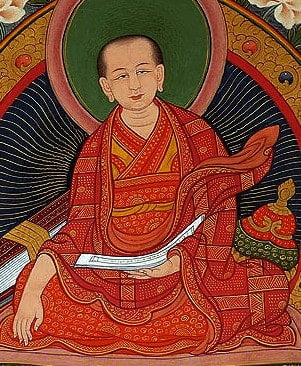Born in 1101 at Luro, Chekawa Yeshe Dorje studied as a young boy with the great disciple of Milarepa, Rechungpa. He took the vows of novice monk at the age of twenty-one at Loro Zhingsar and was given the name Yeshe Dorje.
In 1130, he encountered Geshe Sharawa Yonten Drak (1070-1141). Struck by the profundity of his teachings, he remained with this master for sixteen years. Under Sharawa he extensively studied Lojong teachings. Reportedly, he asked Sharawa how essential the training giving victory to others was for progressing on the path. And tradition says that Geshe Sharawa replied, “If you want to attain enlightenment, this practice is essential.”
Under Sharawa, Yeshe Dorje became a highly regarded teacher in the Kadampa tradition. Yeshe Dorje was known as Chekawa (mChad kha ba) because he practiced reflecting on impermanence regularly in the charnel grounds where bodies were dismembered (mchad pa).
Yeshe Dorje is best known for his teachings on “Exchanging self with others” based on the words of Atisha and his principal disciples. His pithy treatise on Lojong entitled The Seven Point Mind Training (blo sbyong don bdun ma) summarizes this fundamental Mahayana practice of compassion. It is said that until he wrote down these profound instructions, the teaching on exchanging self and others had remained an oral tradition, only passed down to the most courageous and committed bodhisattvas. According to the traditional story, Geshe Chekawa taught this practice to a group of lepers. Through diligent practice, they were able to cure themselves of their disease. This episode became renowned as the “leper practice” (mdze chos) and Chekawa decided that due to its great potential, the instructions should be written down.
Yeshe Dorje took over the head of the monastery after Sharawa’s death in 1141. He based his extensive Lamrim teachings on notes from Sharawa’s lectures.
Train constantly in three basic principles
The Commitments of Mind Training from The Seven Point Mind Training (blo sbyong don bdun ma), translated by Adam Pearcey, 2012.
Change your attitude, but remain natural.
Don’t speak of injured limbs.
Don’t ponder others’ flaws.
Train first with the strongest destructive emotions.
Abandon any expectations of results.
Give up poisonous food.
Don’t be so loyal to the cause.
Don’t lash out in retaliation.
Don’t lie in ambush.
Don’t strike a vulnerable point.
Don’t transfer the ox’s burden to the cow.
Don’t be competitive.
Don’t misperform the rites.
Don’t reduce gods to demons.
Don’t seek others’ misery as crutches of your own happiness.
Image courtesy of Rigpa Wiki


